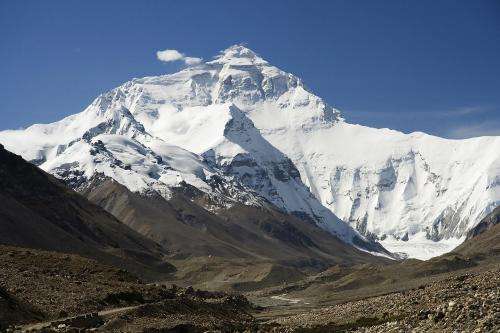The north face of Mount Everest seen from the path to the base camp in Tibet Autonomous Region, China. Credit: Luca Galuzzi/Wikipedia.
(Phys.org)—A trio of researchers, two with Columbia Business School in the U.S. and the other with INSEAD in France, has found that statistically, mountain climbers in the Himalayas, tend to meet both with more success and death if they are from a hierarchical type society than if they are from a less hierarchical society. In their paper published in Proceedings of the National Academy of Sciences, Eric Anicih, Roderick Swaab and Adam Galinsky describe how they compared societal hierarchical data with mountain climbing experiences to come up with their findings.
To find out if there might be a correlation between mountain climbing (or other high risk ventures), success and/or deaths during expeditions and societal experience, the researchers used data from prior research that ranked countries by their degree of emphasis on hierarchy and general respect for authority. The thinking was, apparently, that expedition members are more likely to follow a leader regardless of their own feelings if they are from a society that places high emphasis on doing so. They compared what they found with data from over 5,0000 expeditions involving over 30,000 climbers from 56 countries, in the Himalayas, looking for correlations (taking out incidents of unusually foul weather that might skew results) between society type and success or failure on the mountains.
The researchers report that teams with people from societies with a highly emphasized hierarchy tended to reach the peak more often than teams with people from societies with less of an emphasis on hierarchy or who were less respectful of authority. They also suggest their findings may apply to other situations, noting that an airliner that crashed back in 1990 may have met its fate in part because the pilot was from a society that valued authority so strongly that he refused to take evasive action even after being held up several times by air traffic controllers, endangering the craft and its passengers. A pilot with less concern for authority, they note, would likely have insisted they be allowed to land.
Such deference to authority can lead to other problems, the researchers note—such as mountain climbers blindly following a leader who ultimately leads them to their death.
More information: Hierarchical cultural values predict success and mortality in high-stakes teams, PNAS, www.pnas.org/cgi/doi/10.1073/pnas.1408800112
Abstract
Functional accounts of hierarchy propose that hierarchy increases group coordination and reduces conflict. In contrast, dysfunctional accounts claim that hierarchy impairs performance by preventing low-ranking team members from voicing their potentially valuable perspectives and insights. The current research presents evidence for both the functional and dysfunctional accounts of hierarchy within the same dataset. Specifically, we offer empirical evidence that hierarchical cultural values affect the outcomes of teams in high-stakes environments through group processes. Experimental data from a sample of expert mountain climbers from 27 countries confirmed that climbers expect that a hierarchical culture leads to improved team coordination among climbing teams, but impaired psychological safety and information sharing compared with an egalitarian culture. An archival analysis of 30,625 Himalayan mountain climbers from 56 countries on 5,104 expeditions found that hierarchy both elevated and killed in the Himalayas: Expeditions from more hierarchical countries had more climbers reach the summit, but also more climbers die along the way. Importantly, we established the role of group processes by showing that these effects occurred only for group, but not solo, expeditions. These findings were robust to controlling for environmental factors, risk preferences, expedition-level characteristics, country-level characteristics, and other cultural values. Overall, this research demonstrates that endorsing cultural values related to hierarchy can simultaneously improve and undermine group performance.
Journal information: Proceedings of the National Academy of Sciences
© 2015 Phys.org























